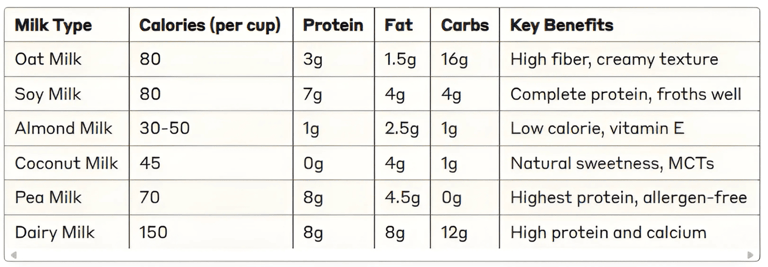Best Plant Milk for Coffee: A Complete Guide to Dairy-Free Coffee Lover
Looking for the best plant milk for coffee? Our expert guide covers top dairy-free options, frothing tips, and how to make barista-quality coffee at home.
HEALTHLANDING PAGE


Millions of coffee lovers struggle with finding the right plant milk that doesn't ruin their favorite brew. Maybe your almond milk curdles in hot coffee, your oat milk tastes too sweet, or that expensive coconut milk just doesn't froth properly for your weekend latte.
Whether you're lactose intolerant, vegan, or simply exploring healthier alternatives, choosing the right non-dairy milk for your coffee makes all the difference in taste, texture, and overall experience.
Why Plant Milk for Coffee is Taking Over Coffee Shops
The plant-based milk market has exploded in recent years. Coffee shops worldwide now offer multiple dairy alternatives, with many baristas noting that plant milk orders have become the norm rather than the exception. But not all plant milks are created equal when it comes to coffee compatibility.
What Makes the Best Plant Milk for Coffee?
The best plant-based milk for coffee depends on five key characteristics: flavor, texture, frothing ability, nutritional content, and temperature stability. Here's what to look for:
Essential Qualities:
Neutral flavor that complements rather than overpowers coffee
Creamy texture that mimics dairy milk richness
Good frothing ability for lattes and cappuccinos
Temperature stability that won't curdle in hot coffee
Nutritional benefits without excessive sugar
Top 5 Best Plant Milks for Coffee
1. Oat Milk—The Barista's Favorite
Why it's perfect for coffee: Oat milk has become the gold standard for coffee shops worldwide. It typically has more protein and fiber than other non-dairy milks, creating a naturally creamy texture that closely resembles dairy milk.
Best for:
Lattes and cappuccinos
Hot coffee drinks
Latte art
Those who want the closest dairy milk experience
Brands to try: Oatly Barista Edition, Califia Farms Oat Barista Blend, Planet Oat Extra Creamy
2. Soy Milk—The Original Plant Milk Champion
Why it works well: Soy milk has the highest protein content among plant milks, making it excellent for frothing. It creates stable microfoam and has a neutral taste that won't compete with your coffee's flavor profile.
Best for:
Espresso-based drinks
Professional barista applications
Those seeking high protein content
Budget-conscious coffee lovers
3. Almond Milk—Light and Nutty
Why coffee lovers choose it: Barista-style almond milk is specifically designed to texture and stretch with high performance, complementing espresso with a smooth nutty flavor.
Best for:
Iced coffee drinks
Those who prefer lighter, less creamy texture
Cold brew coffee
Subtle nutty flavor enhancement
Pro tip: Choose barista-style almond milk for better frothing performance.
4. Coconut Milk—Tropical Richness
Why it's gaining popularity: Coconut milk adds natural sweetness and richness to coffee. The canned version is too thick, but carton coconut milk provides the perfect balance.
Best for:
Iced coffee and cold brew
Those who enjoy tropical flavors
Natural sweetness without added sugar
Keto-friendly coffee options
5. Pea Milk—The Protein Powerhouse
Why it's worth trying: Pea milk offers excellent nutritional benefits with high protein content and a neutral taste. It froths well and provides a creamy texture without common allergens.
Best for:
Those with nut and soy allergies
High-protein diet followers
Neutral taste preference
Sustainable choice seekers
Barista Tips: How to Use Plant Milk in Coffee
For Perfect Frothing:
Use cold milk straight from the refrigerator
Choose barista editions when available
Don't overheat - plant milks can separate at high temperatures
Steam to 140-150°F for optimal texture
Swirl gently to incorporate foam evenly
Avoiding Common Mistakes:
Don't pour plant milk directly into very hot coffee (it may curdle)
Avoid ultra-low-fat versions for frothing
Store opened plant milk properly to maintain freshness
Shake well before use, especially oat and almond milk
Nutritional Comparison
Making Your Own Plant Milk for Coffee
Simple Oat Milk Recipe:
Ingredients:
1 cup old-fashioned oats
4 cups cold water
Pinch of salt
1 tsp vanilla (optional)
Instructions:
Blend oats and water for 30-45 seconds
Strain through cheesecloth or a nut milk bag
Add salt and vanilla
Refrigerate up to 5 days
Pro tip: Don't over-blend oats, as it can make the milk slimy.
Conclusion
The best plant milk for your coffee depends on your personal taste preferences, dietary needs, and brewing methods. Oat milk remains the top choice for most coffee applications due to its creamy texture and neutral flavor, while soy milk offers the best protein content and frothing ability.
Start with oat milk if you're new to plant-based coffee, then experiment with other options to find your perfect match.

